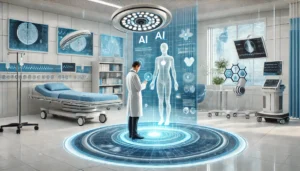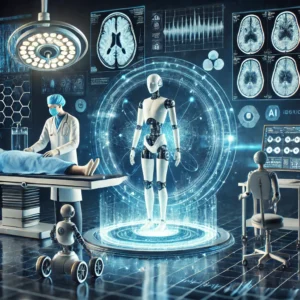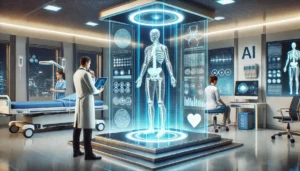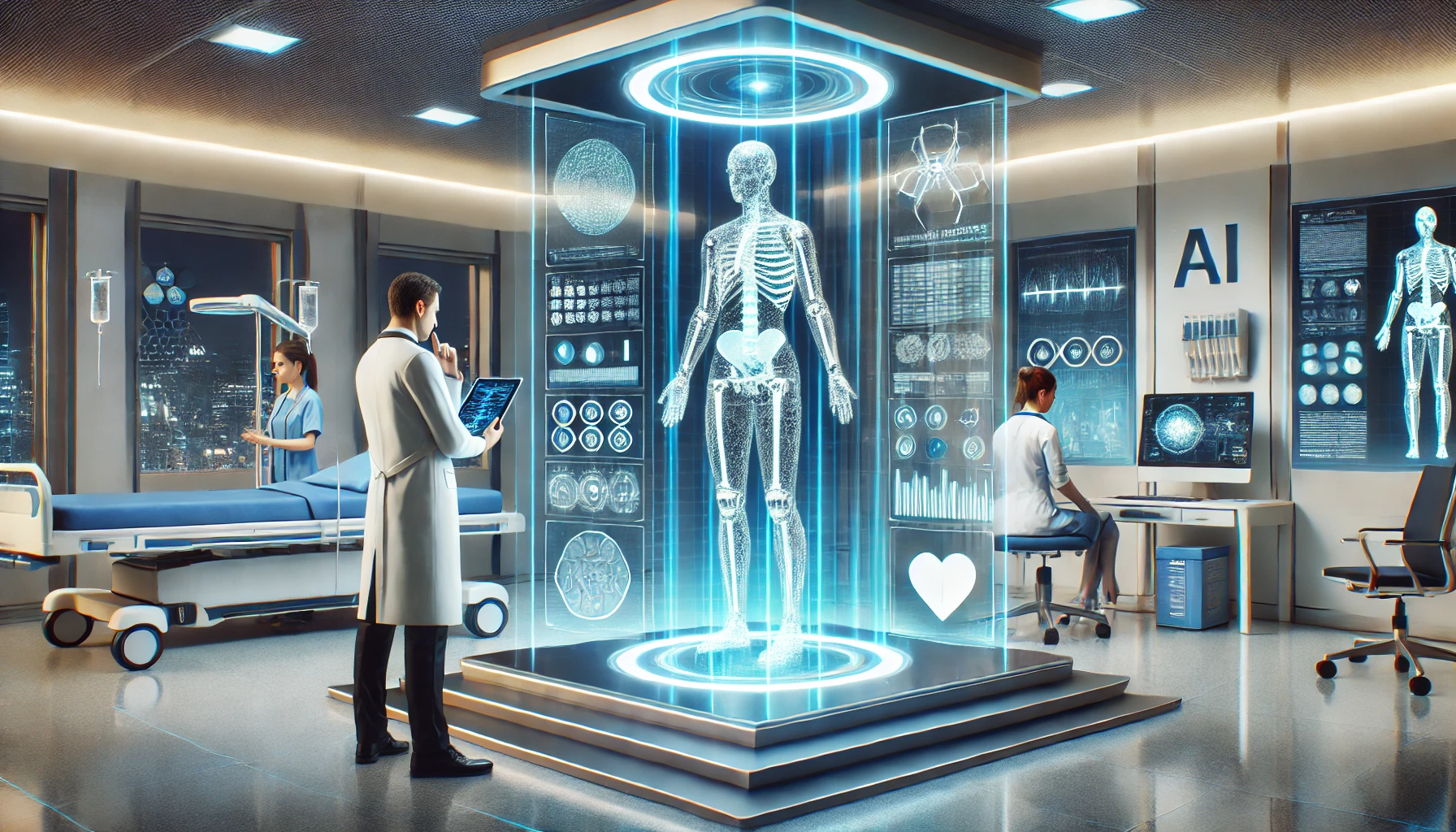
AI in Healthcare: Revolutionizing Diagnosis and Treatment
Artificial Intelligence (AI) is transforming healthcare, driving innovations that enhance diagnosis, treatment, and patient care. With its ability to process vast amounts of data, detect patterns, and make intelligent predictions, AI is improving medical accuracy, reducing human errors, and personalizing treatments. From early disease detection to robotic-assisted surgeries, AI is shaping the future of medicine, making healthcare more efficient, accessible, and effective.
In this article, we will explore the role of AI in medical diagnosis, treatment, drug discovery, healthcare management, and its potential future applications, along with challenges and ethical considerations.
AI in Medical Diagnosis
One of the most significant contributions of AI in healthcare is its ability to assist doctors in diagnosing diseases faster and more accurately. Traditional diagnostic processes are time-consuming and prone to human error, whereas AI can quickly analyze large datasets and identify abnormalities that may be missed by doctors.
- Early Disease Detection
Early detection of diseases can significantly improve treatment outcomes. AI-powered tools are proving highly effective in diagnosing conditions at an early stage.
- Cancer Diagnosis: AI-driven systems analyze mammograms, MRIs, and CT scans to detect early-stage cancers, such as breast, lung, and skin cancer. Deep-learning models can identify patterns in images that are imperceptible to the human eye, improving early detection rates.
- Cardiovascular Diseases: AI predicts heart disease risk by analyzing ECG data, cholesterol levels, and genetic predisposition. AI-powered wearable devices, such as smartwatches, can detect irregular heart rhythms (like atrial fibrillation) and alert patients before a major event like a heart attack.
- Diabetes and Eye Diseases: AI-based ophthalmology tools examine retinal images to diagnose diabetic retinopathy and age-related macular degeneration, preventing blindness in diabetic patients.
- Neurological Disorders: AI analyzes speech patterns, brain scans, and genetic data to detect early signs of Alzheimer’s, Parkinson’s, and multiple sclerosis, enabling early intervention and slowing disease progression.
2. AI in Radiology and Medical Imaging
Radiology relies heavily on image interpretation, which can be time-consuming and subjective. AI algorithms analyze X-rays, MRIs, and CT scans more efficiently, providing real-time insights for doctors.
- AI-powered Imaging Platforms: Companies like Arterys and Zebra Medical Vision use AI to detect fractures, tumors, and abnormalities with high precision, reducing misdiagnosis and unnecessary biopsies.
- Automated Report Generation: AI assists radiologists by automatically generating detailed reports, improving workflow efficiency.
3. AI in Pathology
AI is transforming pathology by analyzing tissue samples and identifying cancerous cells with high accuracy. Digital pathology powered by AI can detect anomalies in biopsy samples, helping pathologists make more informed decisions.

Table of Contents
AI in Treatment & Personalized Medicine
AI is not just improving diagnosis but also revolutionizing treatments through personalized medicine, robotic surgery, and AI-assisted clinical decision-making.
- Personalized Medicine
Traditional medicine follows a “one-size-fits-all” approach, but AI is enabling precision medicine, where treatments are tailored to an individual’s genetic makeup, lifestyle, and medical history.
- Pharmacogenomics: AI analyzes genetic data to predict how a patient will respond to different drugs, helping doctors prescribe the most effective treatment while minimizing side effects.
- Cancer Treatment: AI helps oncologists design targeted therapies by analyzing tumor genetics, making chemotherapy and immunotherapy more effective.
- AI in Mental Health: AI-powered mental health chatbots like Woebot and Wysa provide cognitive behavioral therapy (CBT) to individuals suffering from anxiety and depression, offering personalized support and guidance.
2. AI-Powered Robotic Surgery
AI-driven surgical robots are enhancing precision, minimizing complications, and improving patient recovery.
- Da Vinci Surgical System: This AI-assisted robot allows surgeons to perform minimally invasive procedures with extreme precision, reducing the risk of complications and shortening recovery times.
- AI in Microsurgery: AI-powered robots assist in delicate procedures like neurosurgery and eye surgery, reducing human error and improving outcomes.
3. AI in Rehabilitation and Prosthetics
AI is also playing a key role in rehabilitation by enabling smart prosthetics and exoskeletons.
- Bionic Limbs: AI-powered prosthetic limbs learn from a user’s movements and adapt accordingly, providing a more natural experience for amputees.
- AI in Physical Therapy: AI-driven rehabilitation platforms track a patient’s progress and adjust therapy plans in real-time, improving recovery rates.
AI in Drug Discovery and Development
Developing new drugs is a lengthy and costly process, often taking 10-15 years. AI accelerates drug discovery by analyzing molecular structures, predicting drug interactions, and identifying potential candidates for new medications.
- AI-driven Drug Discovery Platforms: Companies like BenevolentAI and Atomwise use deep learning to identify promising drug molecules, speeding up the process of finding new treatments for diseases like cancer, Alzheimer’s, and even COVID-19.
- AI in Vaccine Development: AI helps researchers model virus structures and design vaccines faster, as seen during the COVID-19 pandemic when AI-assisted platforms helped accelerate vaccine development.
AI in Healthcare Management
AI is optimizing hospital operations, patient care, and healthcare administration, making healthcare systems more efficient.
- Electronic Health Records (EHRs): AI automates data entry, reducing the paperwork burden on doctors and minimizing errors.
- Predictive Analytics: AI predicts patient admissions, helping hospitals allocate resources effectively.
- Virtual Health Assistants: AI-powered chatbots and voice assistants schedule appointments, remind patients to take medications, and provide medical advice, improving accessibility.
Challenges and Ethical Concerns
Despite its advantages, AI in healthcare comes with challenges:
- Data Privacy & Security: Healthcare data is highly sensitive, and AI systems must comply with regulations like HIPAA (Health Insurance Portability and Accountability Act) and GDPR (General Data Protection Regulation) to ensure data security.
- Bias in AI Models: AI models trained on non-representative datasets may produce biased results, leading to disparities in healthcare outcomes.
- Doctor-AI Collaboration: AI should assist, not replace, human doctors. Proper guidelines and regulations must be in place to ensure ethical AI use.
- Cost & Accessibility: Implementing AI in healthcare requires significant investment, and access to AI-driven healthcare solutions must be made affordable for all.

AI in Healthcare
The Future of AI in Healthcare
AI is set to play an even more significant role in the future of healthcare with advancements in deep learning, quantum computing, and the Internet of Medical Things (IoMT).
- AI-driven Hospitals: Future hospitals may use AI-powered robots for surgeries, AI-driven diagnostics, and smart patient monitoring systems.
- Wearable AI Devices: Smartwatches and wearable health trackers will become more advanced, continuously monitoring health parameters and alerting doctors in case of abnormalities.
- AI in Elderly Care: AI-powered home assistants will help elderly patients manage medications, detect falls, and provide emergency assistance.
- Genomic Medicine & AI: AI will revolutionize gene therapy, enabling the treatment of rare genetic disorders.
Conclusion
AI is revolutionizing healthcare by improving diagnostics, enabling personalized treatments, optimizing hospital management, and accelerating drug discovery. While challenges remain, the benefits far outweigh the risks. As AI continues to evolve, it holds the potential to create a smarter, more efficient, and patient-centered healthcare system.
With responsible implementation and ethical considerations, AI will continue to push the boundaries of medicine, making quality healthcare accessible to all. The future of AI in healthcare is not just promising—it is transformative.
FAQs on “AI in Healthcare: Transforming Diagnosis and Treatment for a Smarter Future”:
- What is AI in healthcare?
AI in healthcare refers to the use of artificial intelligence technologies, such as machine learning, deep learning, and natural language processing, to enhance medical diagnosis, treatment, and patient care.
- How is AI transforming medical diagnosis?
AI-powered tools can analyze medical images, detect diseases at early stages, and assist doctors in making faster and more accurate diagnoses. Examples include AI in radiology for detecting tumors, AI-driven pathology, and predictive analytics for disease forecasting.
- Can AI replace doctors in healthcare?
No, AI is designed to assist doctors, not replace them. While AI can analyze vast amounts of data quickly and suggest diagnoses or treatments, human expertise is still essential for decision-making, patient interaction, and ethical considerations.
- What role does AI play in treatment planning?
AI helps personalize treatment by analyzing patient data, predicting drug responses, and optimizing therapy plans. It is used in areas like precision medicine, robotic surgery, and AI-driven drug discovery.
- How is AI improving patient care?
AI enhances patient care by enabling virtual health assistants, remote monitoring, early disease detection, and automation of administrative tasks, allowing healthcare professionals to focus more on patient needs.
- What are some real-world examples of AI in healthcare?
- IBM Watson Health for cancer diagnosis and treatment recommendations
- Google’s DeepMind for eye disease detection
- AI-powered robotic surgery systems like Da Vinci Surgical System
- Chatbots for mental health support, such as Woebot
7. Are there any risks or challenges in AI-driven healthcare?
Yes, challenges include data privacy concerns, ethical issues, biases in AI algorithms, regulatory hurdles, and the need for high-quality medical datasets to train AI models effectively.
- How does AI help in drug discovery?
AI accelerates drug discovery by analyzing chemical compounds, predicting their effectiveness, and identifying potential treatments faster than traditional methods, reducing costs and development time.
- Is AI used in mental health treatment?
Yes, AI is used in mental health apps for therapy, mood tracking, and crisis intervention. AI chatbots and virtual therapists help provide psychological support and detect signs of mental health disorders.
- What is the future of AI in healthcare?
The future of AI in healthcare includes enhanced precision medicine, AI-powered hospitals, autonomous AI diagnostics, advanced robotic surgeries, and more seamless integration of AI with wearable health tech.
Summary
Artificial Intelligence (AI) is transforming healthcare by improving diagnosis, treatment, and patient care with unprecedented precision and efficiency. AI-powered algorithms analyze vast amounts of medical data, helping doctors detect diseases at an early stage and recommend personalized treatments based on patient history and genetic factors. Machine learning enhances diagnostic imaging, assists in predicting patient outcomes, and accelerates drug discovery, reducing the time needed to develop new medications.
Additionally, AI-driven robotic surgeries enable minimally invasive procedures with higher accuracy, reducing recovery times and risks. Virtual health assistants and chatbots improve patient engagement by providing round-the-clock medical advice and reminders for medication adherence. AI is also playing a crucial role in managing healthcare operations, optimizing hospital workflows, and reducing administrative burdens.
Despite these advancements, challenges such as data privacy, ethical concerns, and the need for regulatory oversight must be addressed to ensure safe and responsible AI integration. As technology continues to evolve, AI is set to revolutionize healthcare, making it more efficient, accessible, and capable of delivering better health outcomes worldwide.
Unlock the Ancient Wisdom of Sanatan Dharma – Join Us on YouTube!
👉 Subscribe now to Prachin Sanatan Dharma and embark on a journey of enlightenment.
Explore timeless teachings, spiritual insights, and cultural richness on our YouTube channel, Prachin Sanatan Dharma. Dive deep into the essence of Sanatan Dharma through captivating videos that inspire and educate.
Related Articles
- Restful Nights: Ayurvedic Remedies and Traditional Indian Practices to Overcome Insomnia and Late-Night Habits
- The Tridevi: Lakshmi, Saraswati, and Parvati – Their Roles and Powers
- “Divine Creatures of Ancient Indian Scriptures: Exploring the Role of Animals in the Vedas, Puranas, and Mahabharata”
- Nature and Spirituality: Exploring the Sacred Essence of the Himalayas, Ganga, and Other Natural Wonders”
- “Reviving the Gurukul System: Relevance and Lessons for Modern Education”
- “Exploring Greek and Indian Mythology: Similarities Between Greek and Indian Mythology “
- “Embracing Sattvic Living: Harmonizing Mind, Body, and Soul Through Food and Lifestyle”
- “Charity and Prosperity: Exploring the Concept of Daan and Its Financial Relevance in Modern Life”
- How to Build an Eco-Friendly Home Inspired by Vastu Shastra
- Comparison of Ancient and Modern Sports: How Traditional Sports Have Influenced Contemporary Games
- “Timeless Lessons from Ancient Tales: Linking Samudra Manthan and Ganga’s Descent to Modern Ecological Challenges”
- “Reviving Sanskrit: How AI is Preserving Ancient Languages for the Future”
- “Mathura: The Sacred Land of Lord Krishna’s Divine Leelas”
- Investing for Future Generations: Lessons from Indian Traditions on Legacy Building and Wealth Preservation
- “Ancient Indian Wisdom: Timeless Lessons for Tackling Today’s Climate Crisis”
- “Artificial Intelligence and Spirituality: Transforming Ancient Practices for the Modern World”
- “Gold and Real Estate in India: Timeless Assets Shaping Financial Strategies”
- Tradition Meets Innovation: The Evolution of Technology in Hindu Rituals
- End-of-World Myths: Exploring Kali Yuga in Hinduism and Ragnarök in Norse Mythology
- Garuda, Pegasus, and Dragons: The Universal Ties of Mythical Beasts Across Cultures
- “Ancient Vimanas: Mythical Flying Machines or Evidence of Advanced Technology?”
- Time Travel in Hindu Mythology: The Fascinating Tales of Kakudmi and King Raivata
- “Divine Feminine Power in Hindu Mythology: The Legends of Durga, Saraswati, and Lakshmi”
- “Divine Beings of Sanatan Dharma: The Spiritual Significance of Sacred Animals in Hinduism”
- “Symbolism in Mythological Art: Unlocking Hidden Meanings in Ancient Temple Carvings”
- “Exploring Technological Advancements in Ancient India and Civilizations: Vimana, Metallurgy, & Water Management systems”
- Unveiling the Mysteries: Ancient Temples of Sanatan Dharma , Mysterious Temples of India
- “The Scientific Knowledge of Sanatan Dharma: Ancient Wisdom Meets Modern Science”
- Ancient Indian Sports and Games: Celebrating a Legacy of Skill, Strength & Strategy”
- “Exploring the Cosmic Link: The Connection Between Astronomy and Vedic Astrology”
- The Power of Sanskrit: Unlocking the Divine Language of the Gods
- “The End of Kaliyuga: A Sanatan Insight into the World’s Final Chapter”
- Explore more articles on Prachin Sanatan Yuga.
AI in Healthcare AI in Healthcare AI in Healthcare AI in Healthcare AI in Healthcare AI in Healthcare AI in Healthcare AI in Healthcare AI in Healthcare AI in Healthcare AI in Healthcare AI in Healthcare AI in Healthcare AI in Healthcare AI in Healthcare AI in Healthcare AI in Healthcare AI in Healthcare AI in Healthcare AI in Healthcare AI in Healthcare
Artificial Intelligence (AI) is transforming healthcare by improving diagnosis, treatment, and patient care with unprecedented precision and efficiency. AI-powered algorithms analyze vast amounts of medical data, helping doctors detect diseases at an early stage and recommend personalized treatments based on patient history and genetic factors. Machine learning enhances diagnostic imaging, assists in predicting patient outcomes, and accelerates drug discovery, reducing the time needed to develop new medications.
Artificial Intelligence (AI) is transforming healthcare by improving diagnosis, treatment, and patient care with unprecedented precision and efficiency. AI-powered algorithms analyze vast amounts of medical data, helping doctors detect diseases at an early stage and recommend personalized treatments based on patient history and genetic factors. Machine learning enhances diagnostic imaging, assists in predicting patient outcomes, and accelerates drug discovery, reducing the time needed to develop new medications.
Artificial Intelligence (AI) is transforming healthcare by improving diagnosis, treatment, and patient care with unprecedented precision and efficiency. AI-powered algorithms analyze vast amounts of medical data, helping doctors detect diseases at an early stage and recommend personalized treatments based on patient history and genetic factors. Machine learning enhances diagnostic imaging, assists in predicting patient outcomes, and accelerates drug discovery, reducing the time needed to develop new medications.
Artificial Intelligence (AI) is transforming healthcare by improving diagnosis, treatment, and patient care with unprecedented precision and efficiency. AI-powered algorithms analyze vast amounts of medical data, helping doctors detect diseases at an early stage and recommend personalized treatments based on patient history and genetic factors. Machine learning enhances diagnostic imaging, assists in predicting patient outcomes, and accelerates drug discovery, reducing the time needed to develop new medications.
